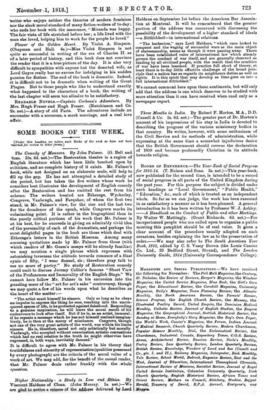SOME BOOKS OF THE WEEK.
[7.7r.iler this heading we notice such Books of the week as have not been +aimed for review in other forms.]
English literature which has been little touched upon by otiticism, and no complete history of it exists. Mr. Palmer's book, while not designed on an elaborate scale, will help to tll up the gap. He has not attempted a detailed study of the period, but has taken the five writers whose work he considers best illustrates the development of English comedy after the Restoration and has omitted the rest from his scheme. The writers treated are Etherege, Wycherley, Congreve, Vanbrugh, and Farquhar, of whom the first two stand, in Mr. Palmer's view, for the rise and the last two for the decadence of the epoch, while Congreve marks its oultninating point. It is rather in the biographical than in the purely critical portions of his work that Mr. Palmer is at his best, for he succeeds in giving an admirably vivid idea of the personality of each of the dramatists, and perhaps the most delightful pages in the book are those which deal with Etherege's letters in the British Museum. Among many amusing quotations made by Mr. Palmer from these (with which readers of Mr. Gosse's essays will be already familiar) we may mention a single phrase which expresses with
astonishing terseness the attitude towards romance of a blasé cynic of fifty, "I wear flannel, sir ; therefore pray talk to
me no more of poetry." No study of Restoration comedy could omit to discuss Jeremy Collier's famous "Short View of the Profaneness and Immorality of the English Stage." We cannot here follow Mr. Palmer in his excursion into the puzzling maze of the " art for art's sake" controversy, though we may quote a few of his words upon what he describes as the heart of the matter :—
"The artist must himself be sincere. Only so long as he obeys an impulse to express the thine he sees, reaching into the uncon- quered spaces of life, is he protected againstfaleehood. Responding to a genuine inspiration, he will leave the moral result of his endeavours to look after itself. But if he is, as an artist, immoral ; if he repeats a message which he has not himself realized imagina- tively, he is then at the mercy of mischance. Congreve, though not one of the very great artists of the world, was within his limits sincere. He is, therefore, saved not only artistically but morally. Vanbrugh, who accepted without examination artistic conventions which had no real relation to the truth he might otherwise have expressed, is, both ways, inevitably damned."
It is difficult to agree with Mr. PulmPr in his theory that
truthfulness and sincerity of representation (qualities possessed by every photograph) are the criteria of the moral value of a
work of art. We may add, for the benefit of the casual reader, that Mr. Palmer deals rather frankly with the whole question.






























































 Previous page
Previous page